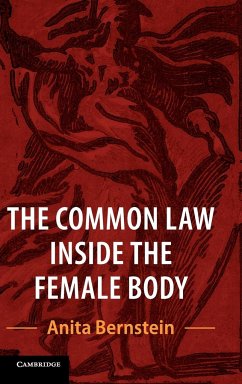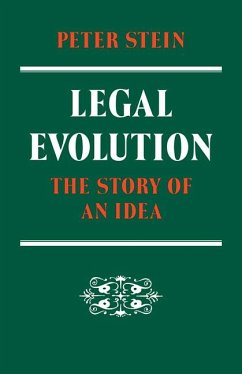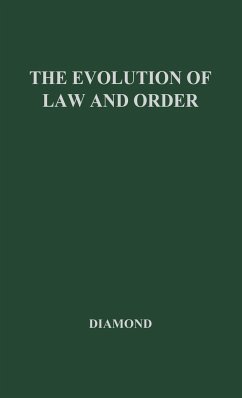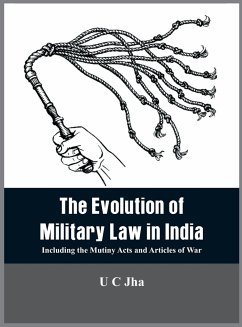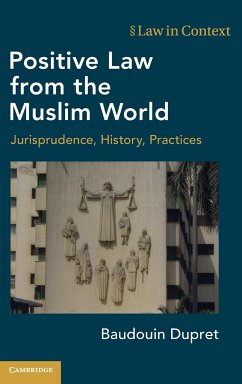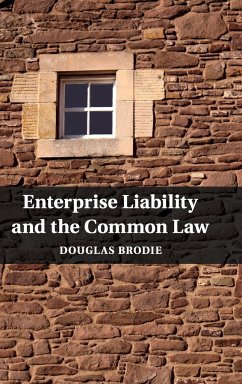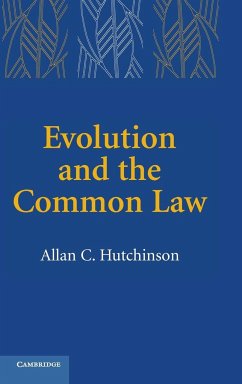
Evolution and the Common Law
Versandkostenfrei!
Versandfertig in 1-2 Wochen
76,99 €
inkl. MwSt.
Weitere Ausgaben:

PAYBACK Punkte
38 °P sammeln!
Short description/annotationThis book challenges existing accounts about the development and operation of the common law.Main descriptionThis book offers a radical challenge to all existing accounts of the common law's development. Contrary to received jurisprudential wisdom, it maintains there is no grand theory which will explain satisfactorily the dynamic interactions of change and stability in the common law's history. Offering fresh and original readings of Charles Darwin's and Hans-Georg Gadamer's works, the book shows that law is a rhetorical activity that can only be properly appreciat...
Short description/annotation
This book challenges existing accounts about the development and operation of the common law.
Main description
This book offers a radical challenge to all existing accounts of the common law's development. Contrary to received jurisprudential wisdom, it maintains there is no grand theory which will explain satisfactorily the dynamic interactions of change and stability in the common law's history. Offering fresh and original readings of Charles Darwin's and Hans-Georg Gadamer's works, the book shows that law is a rhetorical activity that can only be properly appreciated in its historical and political context; tradition and transformation are locked in a mutually reinforcing but thoroughly contingent embrace. In contrast to the dewy-eyed offerings of much contemporary work, it demonstrates that, like life, law is an organic process (i.e., events are the products of functional and localized causes) rather than a miraculous one (i.e., events are the result of some grand plan or intervention). In short, common law is a perpetual work-in-progress - evanescent, dynamic, messy, productive, tantalising, and bottom-up.
Table of contents:
1. Evolution and the common law: an introduction; 2. Darwin's excellent adventure: evolution and law; 3. The creationists' persistence: jurisprudence and God; 4. Taming the bulldog: the natural and pragmatic; 5. Tracking the common law: the routine and revolutionary; 6. Looking for Gadamer: traditions and transformations; 7. Reading between the lines: courts and constitutions; 8. Making changes: progress and politics; 9. Among the trees: a conclusion.
This book challenges existing accounts about the development and operation of the common law.
Main description
This book offers a radical challenge to all existing accounts of the common law's development. Contrary to received jurisprudential wisdom, it maintains there is no grand theory which will explain satisfactorily the dynamic interactions of change and stability in the common law's history. Offering fresh and original readings of Charles Darwin's and Hans-Georg Gadamer's works, the book shows that law is a rhetorical activity that can only be properly appreciated in its historical and political context; tradition and transformation are locked in a mutually reinforcing but thoroughly contingent embrace. In contrast to the dewy-eyed offerings of much contemporary work, it demonstrates that, like life, law is an organic process (i.e., events are the products of functional and localized causes) rather than a miraculous one (i.e., events are the result of some grand plan or intervention). In short, common law is a perpetual work-in-progress - evanescent, dynamic, messy, productive, tantalising, and bottom-up.
Table of contents:
1. Evolution and the common law: an introduction; 2. Darwin's excellent adventure: evolution and law; 3. The creationists' persistence: jurisprudence and God; 4. Taming the bulldog: the natural and pragmatic; 5. Tracking the common law: the routine and revolutionary; 6. Looking for Gadamer: traditions and transformations; 7. Reading between the lines: courts and constitutions; 8. Making changes: progress and politics; 9. Among the trees: a conclusion.





